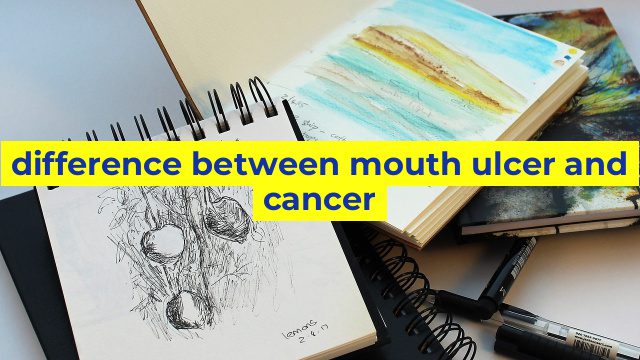Differences between mouth ulcer and cancer
Mouth ulcers and cancer are two different conditions of the mouth that are commonly misinterpreted as the same thing. Although they may share some similarities in their symptoms, causes, and treatment, they are fundamentally different health issues that require different approaches.
Mouth Ulcer
A mouth ulcer, also known as a canker sore, is a small, painful sore that appears on the inside of the mouth, often on the tongue, lips, or gums. Mouth ulcers are quite common, affecting about 20% of the population at any given time. They are often caused by stress, trauma to the mouth, or certain types of food.
Mouth ulcers are not contagious and usually clear up on their own within a week or two. However, they can be very painful and irritating, especially when eating or talking. Over-the-counter medications, such as pain relievers and mouthwashes, can help alleviate the symptoms of mouth ulcers.
Cancer
Cancer of the mouth, also known as oral cancer, is a serious and potentially life-threatening condition that occurs in the cells of the mouth and throat. It can develop on the tongue, lips, gums, or the roof or floor of the mouth, and is often characterized by unusual growths or lesions that do not heal or go away.
Oral cancer can be caused by a variety of factors, including tobacco and alcohol use, HPV infection, and exposure to certain chemicals. It is important to note that, unlike mouth ulcers, oral cancer is not a common health issue and requires prompt medical attention.
If left untreated, oral cancer can spread to other parts of the body and become life-threatening. Treatment options for oral cancer may include surgery, radiation therapy, chemotherapy, or a combination of these.
The Bottom Line
While mouth ulcers and cancer may share some similarities, they are completely different health issues. Mouth ulcers are common, non-contagious, and usually heal on their own, while oral cancer is rare, potentially life-threatening, and requires prompt medical attention.
If you are experiencing any unusual symptoms in your mouth, such as persistent sores, growths, or lesions, you should always seek medical advice. Early diagnosis and treatment can greatly improve the outlook for both mouth ulcers and oral cancer.
Table difference between mouth ulcer and cancer
| Characteristics | Mouth Ulcer | Oral Cancer |
|---|---|---|
| Cause | Stress, injury, autoimmune disorders, viral infections, nutritional deficiencies | Uncontrolled cell growth in the mouth tissues |
| Appearance | Small, painful, white or yellowish in color, usually on the inside of the cheeks, lips, or tongue | Irregular-shaped red or white patch, ulcer, or growth that does not heal within 2-3 weeks and may bleed or cause pain |
| Symptoms | Pain, discomfort, burning sensation, may go away on its own | Persistent pain, swelling, numbness, difficulty in swallowing, speaking, and moving the jaw or tongue |
| Risk factors | Stress, injury, poor oral hygiene, food allergies, smoking, certain medications, alcohol, immunosuppressive disorders | Tobacco use, excessive alcohol consumption, HPV infection, poor diet, exposure to certain chemicals and radiation, family history of cancer |
| Treatment | Over-the-counter pain relievers, mouthwash, avoiding spicy or acidic foods, maintaining good oral hygiene | Surgery, chemotherapy, radiation therapy, targeted therapy, palliative care |

